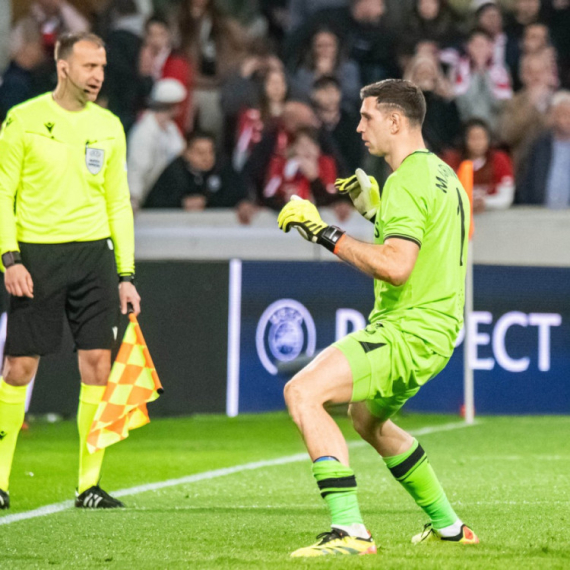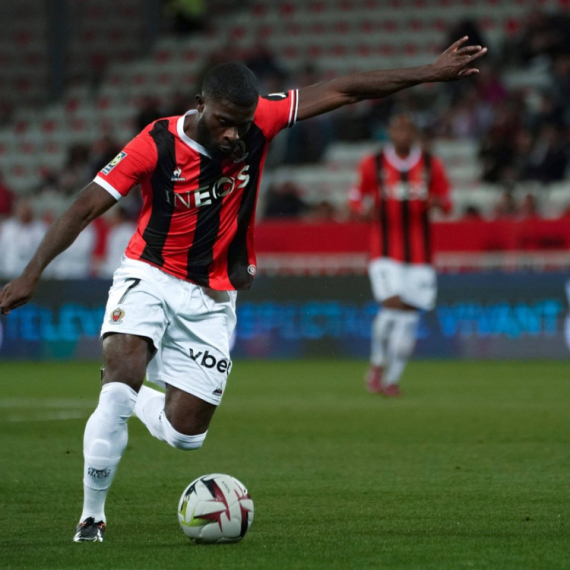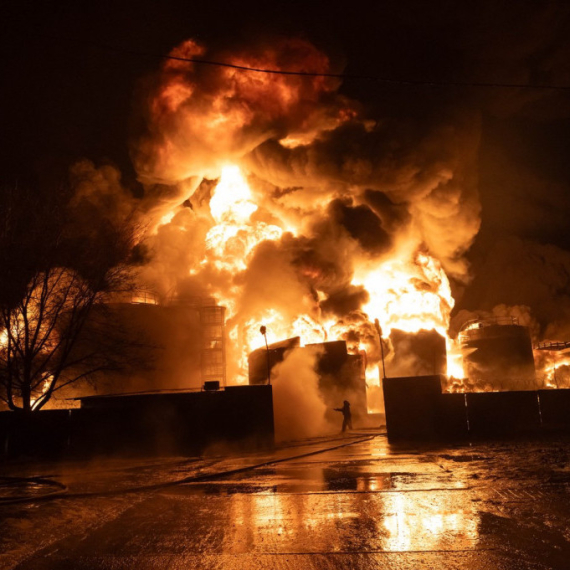Cold War never ended, Russia's NATO rep says
The Cold War was never over and the U.S. sees Russia as an enemy, Dmitry Rogozin says.
Friday, 22.08.2008.
18:38

The Cold War was never over and the U.S. sees Russia as an enemy, Dmitry Rogozin says. Russia's ambassador to NATO told the Belgrade daily Vecernje Novosti in an exclusive interview published Friday that this American perception remains, "regardless of whether Russia is a communist country or a dictatorship". Cold War never ended, Russia's NATO rep says Speaking about the Georgian attack on South Ossetia, Rogozin said that without support from abroad, Georgian President Mikheil Saakashvili, "even though he is mentally unstable", would never have undertaken "this thoughtless plan". "Everybody is convinced that America delivered arms, gave money and took care of the leading Georgian Army figures. Just before the attack, the U.S. and Georgian militaries conducted a joint exercise. We don't know if the U.S. soldiers left Georgia at all before Saakashvili's aggression started," he continued. Asked whether the situation in Kosovo would have developed differently had the crisis in Georgia preceded it, Rogozin said that Russia's position is "always consistent and permanent". "As you recall, we have for years supported the territorial integrity of both countries – Serbia and Georgia. But, after the Georgian massacre, we are doubtful if Ossetians and Abkhazis can live with Georgians," he explained. Rogozin also said that the situations in Kosovo and the two Georgian breakaway regions are completely different. "In the first case, the land which is absolutely Serb was snatched by [ethnic] Albanians who became a vast majority thanks to the exodus of the local Serb population. Serbs were running away from bandits that had NATO support. In the second case, Georgia is trying to hold on to a region that never belonged to it." "This province is merely a gift they were given by Georgian Stalin while they were a part of the USSR," he said of South Ossetia. "The Kosovo separatists were supported by Western politicians, while in the case of South Ossetia and Abkhazia they insist on Georgia's territorial integrity. Naturally, all participants in frozen conflicts considered the recognition of Kosovo a pure precedent," Rogozin told the newspaper. Asked whether Russia could have done more in order for Kosovo not to see a similar fate, the Russian diplomat said that "Russia of 1999 and Russia today are not the same country". "No, they are not the same country at all! I think that today the NATO bombing would have been less likely and that history would have taken a different course," he said. But the future of South Ossetia and Abkhazia, according to Rogozin, is not up to Russia, or other countries to decide. "As President [Dmitry] Medvedev and Premier [Vladimir] Putin have said, we will accept any status decisions these provinces reach. As far as I'm concerned, I do not predict their life with Georgians after all that has taken place. Georgia proved itself to be unsustainable even in its de facto borders," the Russian NATO ambassador warned. Asked to comment on Washington's reaction to the crisis and whether he thought Americans would use their army to help Georgia, Rogozin said that Russia "expected a more comprehensive reaction from the West". "Obviously, America has invested a lot in the Saakashvili project, to now abandon him after his genocidal actions where he didn't even try to save their reputation," he continued. Asked whether all this means that a new Cold War is ahead of us, Rogozin said that "unfortunately, obviously, it never ended". "We in Russia said that after the collapse of the Soviet Union, the conflict was over and we were all 'friends'. It is clear now that that's not the case. America sees Russia as an enemy regardless of whether it’s a communist or a democratic country. The missile shield agreement signed in a hurry between Poland and America is blatant proof for that," he said. As for Russia's expectations regarding a NATO reaction, Rogozin said that "if the NATO countries did not have enough courage and honor to support Russia, we hope that at the very least they will be smart enough not to spoil their cooperation with Russia because of Saakashvili's mental breakdown". "For the time being, Russia will not degrade her relations with NATO, but Moscow's future position will depend on whether the members of the North-Atlantic Alliance will undertake hostile action. Regardless of the fact that some aspects of the military cooperation have been put on hold, or cancelled, Moscow will not be the one to initiate a degrading of relations," Rogozin concluded. Dmitry Rogozin (Beta)
Cold War never ended, Russia's NATO rep says
Speaking about the Georgian attack on South Ossetia, Rogozin said that without support from abroad, Georgian President Mikheil Saakashvili, "even though he is mentally unstable", would never have undertaken "this thoughtless plan"."Everybody is convinced that America delivered arms, gave money and took care of the leading Georgian Army figures. Just before the attack, the U.S. and Georgian militaries conducted a joint exercise. We don't know if the U.S. soldiers left Georgia at all before Saakashvili's aggression started," he continued.
Asked whether the situation in Kosovo would have developed differently had the crisis in Georgia preceded it, Rogozin said that Russia's position is "always consistent and permanent".
"As you recall, we have for years supported the territorial integrity of both countries – Serbia and Georgia. But, after the Georgian massacre, we are doubtful if Ossetians and Abkhazis can live with Georgians," he explained.
Rogozin also said that the situations in Kosovo and the two Georgian breakaway regions are completely different.
"In the first case, the land which is absolutely Serb was snatched by [ethnic] Albanians who became a vast majority thanks to the exodus of the local Serb population. Serbs were running away from bandits that had NATO support. In the second case, Georgia is trying to hold on to a region that never belonged to it."
"This province is merely a gift they were given by Georgian Stalin while they were a part of the USSR," he said of South Ossetia.
"The Kosovo separatists were supported by Western politicians, while in the case of South Ossetia and Abkhazia they insist on Georgia's territorial integrity. Naturally, all participants in frozen conflicts considered the recognition of Kosovo a pure precedent," Rogozin told the newspaper.
Asked whether Russia could have done more in order for Kosovo not to see a similar fate, the Russian diplomat said that "Russia of 1999 and Russia today are not the same country".
"No, they are not the same country at all! I think that today the NATO bombing would have been less likely and that history would have taken a different course," he said.
But the future of South Ossetia and Abkhazia, according to Rogozin, is not up to Russia, or other countries to decide.
"As President [Dmitry] Medvedev and Premier [Vladimir] Putin have said, we will accept any status decisions these provinces reach. As far as I'm concerned, I do not predict their life with Georgians after all that has taken place. Georgia proved itself to be unsustainable even in its de facto borders," the Russian NATO ambassador warned.
Asked to comment on Washington's reaction to the crisis and whether he thought Americans would use their army to help Georgia, Rogozin said that Russia "expected a more comprehensive reaction from the West".
"Obviously, America has invested a lot in the Saakashvili project, to now abandon him after his genocidal actions where he didn't even try to save their reputation," he continued.
Asked whether all this means that a new Cold War is ahead of us, Rogozin said that "unfortunately, obviously, it never ended".
"We in Russia said that after the collapse of the Soviet Union, the conflict was over and we were all 'friends'. It is clear now that that's not the case. America sees Russia as an enemy regardless of whether it’s a communist or a democratic country. The missile shield agreement signed in a hurry between Poland and America is blatant proof for that," he said.
As for Russia's expectations regarding a NATO reaction, Rogozin said that "if the NATO countries did not have enough courage and honor to support Russia, we hope that at the very least they will be smart enough not to spoil their cooperation with Russia because of Saakashvili's mental breakdown".
"For the time being, Russia will not degrade her relations with NATO, but Moscow's future position will depend on whether the members of the North-Atlantic Alliance will undertake hostile action. Regardless of the fact that some aspects of the military cooperation have been put on hold, or cancelled, Moscow will not be the one to initiate a degrading of relations," Rogozin concluded.































Komentari 8
Pogledaj komentare